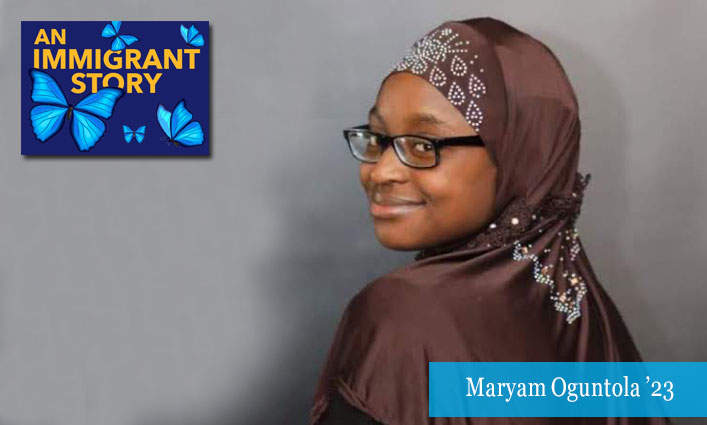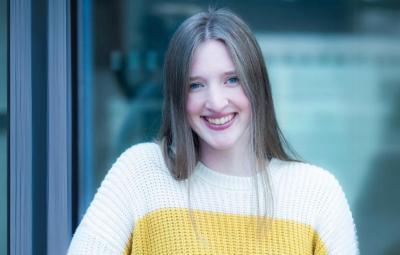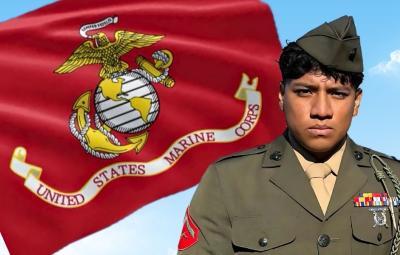
At John Jay College, we know that our diversity is our strength. A vital component of that diversity comes from our proud immigrant community. Over 30 percent of the John Jay student population identifies as being an immigrant—a number that balloons if we consider students who are children of immigrants. In an effort to acknowledge, celebrate, and better understand the immigrant experience at John Jay, we’ve created this article series called “An Immigrant Story.” Here, we hope to share the rich, varied, and inspiring journeys of our students, faculty, staff, and alumni from our immigrant community.
Maryam Oguntola ’23 was born in Nigeria and lived there until she was 12 years old. “In Nigeria, the weather was always good—I never had to wear a jacket—and we were very community-minded,” Maryam recalls. “Neighbors visited each other’s homes regularly and stayed at each other’s homes often.” At home she spoke a mix of Yoruba and English, and her classes were taught in English. “We would get in trouble in school if we were caught speaking in Yoruba, or another language other than English, because there are a lot of different cultures and tribes in Nigeria that all speak different languages.” As a practicing Muslim, Oguntola and her family always looked forward to celebrating Eid and performing naming ceremonies. “Every time a child is born, it’s a very big deal, and they have a naming ceremony. Everyone’s invited, not just the people you know, everyone in your environment is welcomed. There’s meat, fish, pounded yam, different soups, a mix of vegetables—lots of okra.” Oguntola loved the sense of community in her neighborhood, but her parents wanted something else for her and her siblings. “My parents wanted a better education system for us. Both of my parents struggled to study in Nigeria. There can be many union strikes and then classes stop. Even if the students have already paid their money, there are no classes,” she says. “Since our education system is really fast, I was close to going to university with only three years left before it started.”
“My parents wanted a better education system for us.” —Maryam Oguntola
Adjusting to a New Home
Oguntola’s aunt had lived in the United States for decades and she filled out immigration documents for her family to join her. “My parents started to call the immigration center regularly. Luckily enough, we got picked,” she remembers. Their journey to New York City happened to be in December and the blast of cold air was shocking to Oguntola. “I was just wearing a sweater and it was freezing.” Settling into Co-op City, in the Bronx, she was amazed by the tall buildings. “I had never seen 30-story buildings. I had been in a Nigeria bubble and the bubble was suddenly broken.”
“I actually became scared to speak because people would laugh at the way I spoke.” —Maryam Oguntola
Navigating a New School
In Nigeria, Oguntola was an extremely extroverted student who did well in school, even taking advanced classes. When she walked into her new American middle school, she noticed differences about herself from the other students. “I was the only person wearing a hijab. There were lots of different people with different skin colors, but I looked different. I dressed differently, and even though I was speaking English, I sounded different. No one could understand me and nobody wanted to talk to me. I had to constantly repeat myself,” she remembers. “I actually became scared to speak because people would laugh at the way I spoke. Anxiety started to set in because I was out of my comfort zone. I felt alone in my own space.” The tide turned for Oguntola when she met a fellow immigrant student, Victoria, who was from Ghana. “She introduced me to American TV shows and music. We shared a love of reading and she helped me talk with other students.”
Finding Familiarity at John Jay
When it came time to pick a college, John Jay College was Oguntola’s first-choice CUNY institution. She went to an open house on campus and met a fellow Muslim student. “I went up to her and she was like, ‘What do you want to be? Where do you want to go?’ I told her that I wanted to go to law school, and she said, ‘What are you waiting for? This is the school for you,’” Oguntola says with a laugh. After enrolling, she did some research on John Jay programs and student clubs. Oguntola made her way to the SEEK program and the MSA, or Muslim Student Association. “At John Jay, I found myself at a school where people looked like me. There were people who dressed like me. I realized that at John Jay there were a lot of immigrants who felt the same way I did. We’re all here for the same reason, to get an education focused on justice,” she says.
“At John Jay, I found myself at a school where people looked like me. There were people who dressed like me. I realized that at John Jay there were a lot of immigrants who felt the same way I did. We’re all here for the same reason, to get an education focused on justice.” —Maryam Oguntola
One of Oguntola’s favorite moments happened when she walked into an MSA meeting. “As I walked into the MSA room, I saw how close everyone was. I wasn’t just a stranger, they welcomed me,” she says. “One of the Muslim sisters there, Roan, was like, ‘Oh my goodness, you’re so pretty.’ I will always remember that moment. Where I was from didn’t matter at all. Nobody asked me, ‘Are you from Africa?’ When you get that question over and over, as an immigrant you start to feel like you don’t belong. They made me feel at home. They helped me see that John Jay was the right school for me.”
Making New Goals
When Oguntola’s family was living in Nigeria, her mother was a civil government worker and her father was a lawyer who had his own firm. “My parents had to sacrifice their careers in Nigeria for me and my siblings to come here and have more educational opportunities,” she says. “My father couldn’t use his degrees, so he had to start looking for other jobs. Now that I’m older, I realize the extent of their sacrifices and I’m just really grateful for what they’ve done for me.” Both of her parents ended up going back to school in the United States for degrees in education. Now, they’re both teachers.
“To be successful in this country, you need to know people who are going to help you. I want to be that person for somebody else.” —Maryam Oguntola
In her sophomore year, after being accepted into the Honors Program with a 3.981 G.P.A., Oguntola decided to switch her major from Computer Science to Law and Society. “My professor said, ‘It’s not the same law that you’re going to study in law school, instead it’s about studying how the law impacts society and how society impacts the law,’” she says, noting how she plans on following in her father’s footsteps and becoming a lawyer, possibly an immigration lawyer. “To be successful in this country, you need to know people who are going to help you. I want to be that person for somebody else. I understand the struggles and feelings immigrants have because I had the same struggles and feelings. A lot of people coming from other countries go through this and we don’t realize that our experiences are very similar,” says Oguntola. “Most immigrants come to this country for opportunities, because we can’t find opportunities in our own country. But we don’t just take, we also give. It’s a two-way street. We need to learn to accept each other, because at some point, everybody came here from somewhere else.”



